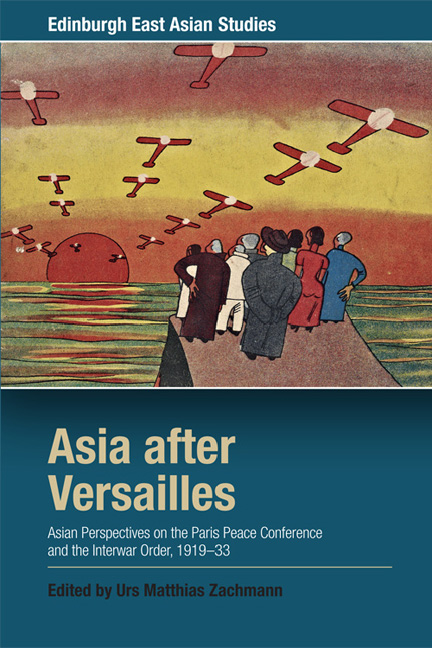 Asia after Versailles
Asia after Versailles Book contents
- Frontmatter
- Contents
- List of Illustrations
- Notes on Contributors
- Acknowledgments
- Introduction: Asia After Versailles
- Part I
- Part II
- 4 A Cultural History of Diplomacy: Reassessing the Japanese ‘Performance’ at the Paris Peace Conference
- 5 India's Freedom and the League of Nations: Public Debates 1919–33
- 6 Dashed Hopes: Japanese Buddhist Perspectives on the Paris Peace Conference
- 7 Particularism and Universalism in the New Nationalism of Post-Versailles Japan
- 8 Versailles and the Fate of Chinese Internationalism: Reassessing the Anarchist Case
- 9 The Impact of Versailles on Chinese Nationalism as Reflected in Shanghai Graphic and Urban Culture, 1919–31
- Index
8 - Versailles and the Fate of Chinese Internationalism: Reassessing the Anarchist Case
from Part II
Published online by Cambridge University Press: 22 December 2017
- Frontmatter
- Contents
- List of Illustrations
- Notes on Contributors
- Acknowledgments
- Introduction: Asia After Versailles
- Part I
- Part II
- 4 A Cultural History of Diplomacy: Reassessing the Japanese ‘Performance’ at the Paris Peace Conference
- 5 India's Freedom and the League of Nations: Public Debates 1919–33
- 6 Dashed Hopes: Japanese Buddhist Perspectives on the Paris Peace Conference
- 7 Particularism and Universalism in the New Nationalism of Post-Versailles Japan
- 8 Versailles and the Fate of Chinese Internationalism: Reassessing the Anarchist Case
- 9 The Impact of Versailles on Chinese Nationalism as Reflected in Shanghai Graphic and Urban Culture, 1919–31
- Index
Summary
The Versailles Peace Conference (1919) is a very familiar topic in China to this day, not least due to the fact that in middle school all Chinese children are confronted with a narrative in their history textbooks that stresses the conference as a typical example of how China has been bullied by Western imperialist powers. Let us first look at the description in a widely used textbook on modern Chinese history:
After the end of World War I, from January to June 1919, the victorious countries including the imperialist powers Great Britain, the US, France and Japan opened the so-called ‘Peace Conference’ in French Paris, but in fact it was a booty-sharing conference to newly distribute the colonies. During World War I China had also participated in fighting Germany, and as a victorious country sent her delegates to participate in the conference. The Chinese delegates proposed to the assembly righteous demands like the abolishment of all privileges imperialism [held] in China, abrogating the [Japanese] ‘Twenty-One Demands’ and regaining sovereignty of Qingdao. But the conference was manipulated by countries like Great Britain, France and the US and rejected the just demands of China. Without reason it even handed over to Japan the sovereignty over Shandong which had been occupied by Germany before the war. When the news arrived in China, it made the fire of rage squeezed in the Chinese people's hearts erupt like a volcano!
The world history textbook, taking up the issue from an international perspective, adds the information: ‘The Chinese delegates refused to sign the “Versailles Peace Treaty”.’ And the Washington Treaty of 1922, which completed the socalled Versailles–Washington Treaty System and finally redressed the problems left unsolved for China by the Versailles Treaty, is evaluated as follows:
In 1922, the delegates of nine powers signed the ‘Nine Powers’ Convention’. This convention declared to respect the integrity of Chinese sovereignty, independence and territory and to observe the principle of ‘open door’ and ‘equal opportunity’ for all countries in China. In reality, this was [only] to serve America's expansionism in China.
- Type
- Chapter
- Information
- Asia after VersaillesAsian Perspectives on the Paris Peace Conference and the Interwar Order, 1919-33, pp. 197 - 211Publisher: Edinburgh University PressPrint publication year: 2017


